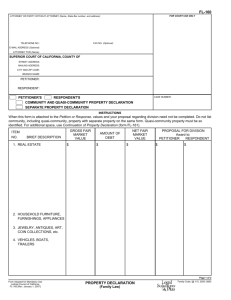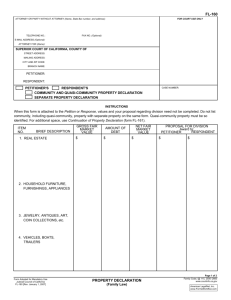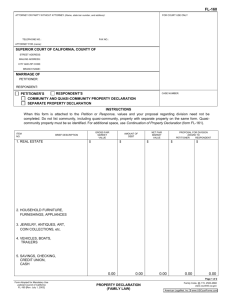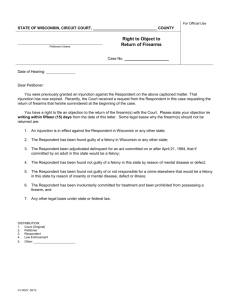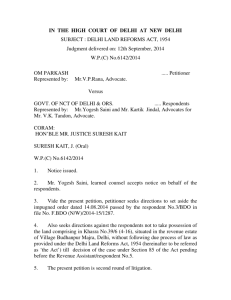STATE OF NORTH CAROLINA - Office of Administrative Hearings
advertisement
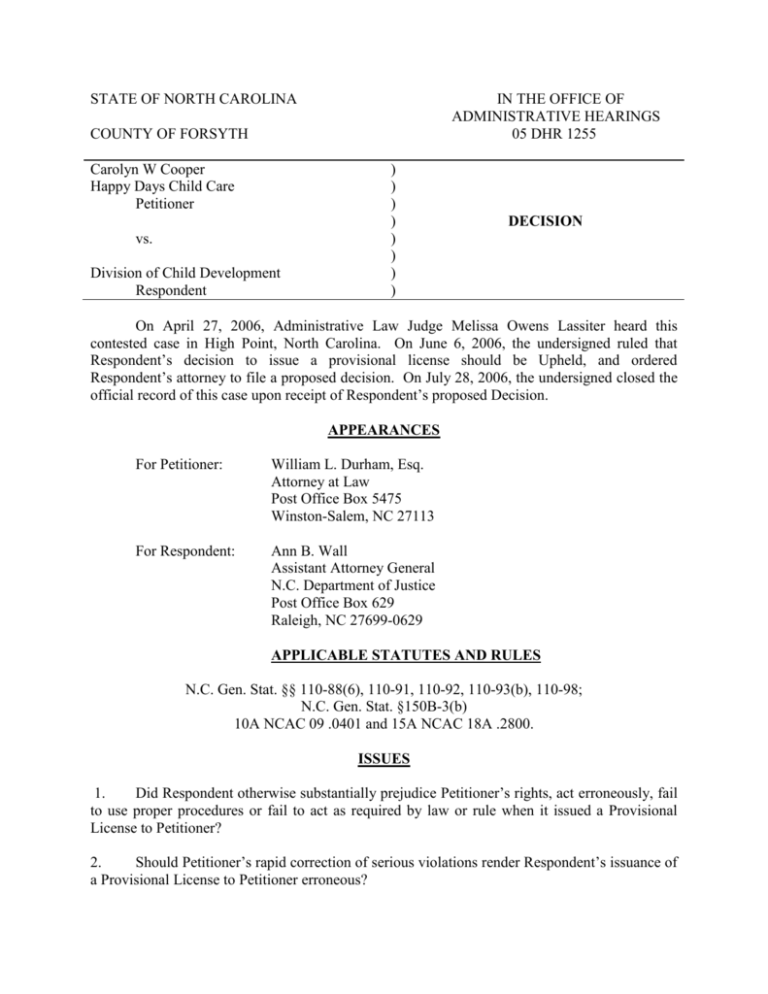
STATE OF NORTH CAROLINA IN THE OFFICE OF ADMINISTRATIVE HEARINGS 05 DHR 1255 COUNTY OF FORSYTH Carolyn W Cooper Happy Days Child Care Petitioner vs. Division of Child Development Respondent ) ) ) ) ) ) ) ) DECISION On April 27, 2006, Administrative Law Judge Melissa Owens Lassiter heard this contested case in High Point, North Carolina. On June 6, 2006, the undersigned ruled that Respondent’s decision to issue a provisional license should be Upheld, and ordered Respondent’s attorney to file a proposed decision. On July 28, 2006, the undersigned closed the official record of this case upon receipt of Respondent’s proposed Decision. APPEARANCES For Petitioner: William L. Durham, Esq. Attorney at Law Post Office Box 5475 Winston-Salem, NC 27113 For Respondent: Ann B. Wall Assistant Attorney General N.C. Department of Justice Post Office Box 629 Raleigh, NC 27699-0629 APPLICABLE STATUTES AND RULES N.C. Gen. Stat. §§ 110-88(6), 110-91, 110-92, 110-93(b), 110-98; N.C. Gen. Stat. §150B-3(b) 10A NCAC 09 .0401 and 15A NCAC 18A .2800. ISSUES 1. Did Respondent otherwise substantially prejudice Petitioner’s rights, act erroneously, fail to use proper procedures or fail to act as required by law or rule when it issued a Provisional License to Petitioner? 2. Should Petitioner’s rapid correction of serious violations render Respondent’s issuance of a Provisional License to Petitioner erroneous? EXHIBITS ADMITTED INTO EVIDENCE For Petitioner: None For Respondent: 1 - 17 FINDINGS OF FACT Based upon the exhibits admitted into evidence, and the sworn testimony of the witnesses, the undersigned finds as follows: 1. Respondent is an administrative agency of North Carolina State Government operating under the laws of North Carolina. Respondent’s Division licenses approximately ninety-four hundred (9,400) family child care homes and centers in North Carolina. (T p. 14, lines 15-16) Respondent issues such licenses based on a five-star system, with five stars being the highest quality of facility. (T p. 24, lines 3-5) Respondent’s child care consultants monitor such facilities by annual compliance and other visits. (T p. 15, lines 1-2, 5-7) 2. Respondent initially licensed Petitioner Happy Days Child Care (“Happy Days”) as a family child care home located at 1490 Harvest Drive in Winston Salem, North Carolina. (T p. 70, lines 5 - 8; R. Ex. 1) Happy Days is located in the basement of Petitioner Cooper’s home. (T p. 56, lines 1-8; R Ex. 15, 16) As a family child care home, Happy Days was not required to undergo sanitation inspections. (T p. 80, lines 1 - 6; 15A NCAC 18A .2834(b) 3. In 2002, Petitioner Happy Days changed from being a “family child care home” to what was then called a “large home,” and what is now called a “child care center.” (T p. 70, lines 6 10) A child care center is a facility licensed to care for more than eight children. (T p. 14, lines 19-21) Environmental Health Inspections 4. A child care center can not operate without an approved sanitation inspection. A center must remain in compliance with the rules governing sanitation to operate. (T p. 38, lines 15-21) Child care facilities must undergo and pass environmental health (“sanitation”) inspections twice yearly by a local Environmental Health Specialist (“EHS”). (T pp. 80, line 22 - 81, line 5) 5. If a sanitation inspection is not conducted at the appropriate time, it is the responsibility of a child care center licensee to request an inspection. (T pp. 38, lines 15 - 21, 74, lines 9 - 14; 10A NCAC 09. 0303(b)) 6. A sanitation inspection leads to a rating determined by the total number of demerits assessed for violations. The possible ratings are superior (0-15 demerits), approved (16 - 30 demerits), provisional (31 - 45 demerits), or disapproved (more than 46 demerits). (T p. 83, lines 3 - 14) In addition, a single six-point demerit results in an automatic provisional rating. (T p. 83, lines 8-9) 2 7. Unless an extension of time is granted, an Environmental Health Specialist conducts a follow-up inspection within seven days (7) after a provisional sanitation rating is issued. (T p. 84, lines 1-9) 8. An Environmental Health Specialist does not have the authority to shut down a child care facility following a provisional or disapproved sanitation rating as that responsibility lies with the Respondent. (T p. 83, lines 15 - 22) 9. To become a child care center, Happy Days was required to undergo a sanitation inspection. (T p. 70, lines 5 - 8, 12 - 20) On March 22, 2002, Happy Days passed a sanitation inspection. (T p. 73, lines 9-18) 10. However, Petitioner Happy Days did not have another sanitation inspection until April 8, 2005. (T p. 73, lines 11 - 18) 11. In March and April 2005, Happy Days held a Three Star license to care for up to twelve (12) children from birth to age twelve (0-12). (T pp. 23, lines 19-21, 24, lines -3-5; R. Ex. 3, 5) April 8, 2005 Sanitation Inspection 12. On March 9, 2005, Respondent’s divisional consultant Carolyn Lindsay conducted an annual compliance visit at Happy Days, cited the center for two sanitation violations, and issued a summary of such visit to Petitioner. (T p. 71, lines 10 - 12; R Ex. 5) 13. Lindsay later amended the March 9, 2005 annual compliance summary by citing Happy Days for the violation of failing to obtain a sanitation inspection between March 22, 2002 and March 9, 2005. (T p. 74, lines 8 - 14; R Ex. 5) 14. When Lindsay realized it had been three (3) years since Happy Days had a sanitation inspection, she called Forsyth County EHS Supervisor Michelle Kirkley about the need for an inspection. (T p. 75, lines 3 - 18; R Ex. 4C, 7) 15. On April 8, 2005, EHS Supervisor Michelle Kirkley and EHS Daniel Lemmons visited Happy Days to conduct the required sanitation inspection. (T pp. 87, lines 7 - 12, 89, lines 4-5; R Ex. 6, 7) Children were present when Ms. Kirkley and Mr. Lemmons arrived to conduct the inspection. (T p. 93, lines 11 - 14; R Ex. 4B, p. 9 # 25, p. 11) 16. Ms. Kirkley cited Happy Days ninety-five (95) demerits for violations they observed at the center, and issued a Disapproved rating to Happy Days. (T pp. 92, lines 6 - 8, 100, lines 11 20; R Ex. 6) 17. Happy Days was the first child care center Ms. Kirkley had ever cited for as many as 95 demerits. Ms. Kirkley was a Registered Sanitarian with more than 15 years experience. (T pp. 73, lines 8-23, 99, lines 5 - 8) 3 18. At the administrative hearing, Petitioner stipulated to the violations upon which Ms. Kirkley cited 95 demerits, and issuing a Disapproved rating to Happy Days. (T pp. 89, lines 1823, 91, lines 8 - 17) The Sewage Problem 19. “Sewage” is defined as “any water that goes into the property and is used in any appliance (sinks, commodes, bathtubs) and then flows into the sewer system.” (T p. 57, lines 2225, p. 58, lines 1-2) 20. Sewage carries pathogenic organisms that cause disease in the human body. Children are especially susceptible to disease, because they are less likely than adults to wash their hands before putting them in their mouths. (T p. 62, lines 14-25, p. 63, lines 1-11) In addition, sewage odors and gases are hazardous to children because of the concentrated amounts of hydrogen sulfide, which can cause poisoning, or asphyxiation. (T p. 62, lines 3-5; R. Ex. 3) 21. During their April 8, 2006 inspection, Ms. Kirkley and Mr. Lemmons discovered a serious sewage or wastewater problem, and called Larry Bunn, Forsyth County Wastewater Program Supervisor for assistance. They also tried to call Respondent during the inspection. Later, Kirkley and Lemmons wrote a letter to Respondent about the discovered sewage problem. (T pp. 101, lines 14 - 15, 107, lines 2 - 15; R Ex. 6, 7) 22. At the administrative hearing, Mr. Bunn was qualified as an expert in all areas of Environmental Health, with a concentration and specialty in wastewater, (T pp. p. 53, lines 6-8, 54, lines 15-20) On April 8, 2005, Mr. Bunn visited Happy Days to assist Ms. Kirkley and Mr. Lemmons. Bunn observed sewage overflowing onto the grounds of the facility, (T p. 55, lines 17-21), and into the playground area. (T p. 102, lines 13-22; R Ex. 6, 7) Based upon his observations, Bunn thought that the sewage had obviously been overflowing for more than one day. (T p. 57, lines 1-19; R Ex. 6, 7) 23. The sump pump pumped sewage from the center’s position below the level of the city sewer system, up to the city sewer system. (T p. 58, lines 7-20; R Ex. ; R Ex. 6, 7, 15, 16, 17) Mr. Bunn thought the failure of the outside sump pump caused the center's sewage problem. Bunn also thought the sump pump malfunction should have been obvious to a layperson. (T p. 63, lines 12-25; R Ex. 6, 7) 24. That day, Ms. Kirkley recommended Petitioner Cooper not permit children to use the playground area until the sewage problem was corrected. (T p. 103, lines 2 - 5; R Ex. 6, 7) 25. Yet, when Kirkley and Lemmon returned to the facility after lunch that day, Kirkley and Lemmon saw children in the playground area. (T p. 103, lines 6-12; R. Ex. 6, 7) 26. Mr. Bunn also inspected a grinder pump located inside an unlocked closet inside Happy Days. (T p. 59, lines 10 - 13; R Ex. 6, 7, 16) Bunn smelled a strong sewage odor upon opening the closet door to the grinder pump area. (T p. 61, lines 22-23; R Ex. 6, 7) He found that the grinder pump was not working correctly, causing sewage comprised of dirty toilet paper and 4 gray water to spill on to the floor. (T p. 59, lines 14-24; R Ex. 6, 7, 17) In Bunn’s opinion, Petitioner and her staff would have known about the grinder pump malfunction, since the pump would not work unless someone manually plugged in the pump. (T pp. 60, lines 2 -15, 61, lines 2 - 19, 63, lines 17 - 24) 27. Bunn opined that he had never seen a more compelling reason to close a day care than what he observed at Happy Days. (T p. 64, lines 19-25) 28. 1-2) Respondent cited these wastewater violations as a six-point demerit item. (T p. 93, lines The Other Six Point Items and Violations 29. During their April 8, 2005 inspection, Ms. Kirkley and Mr. Lemmons also found a dead mouse underneath the two-compartment sink in the center’s kitchen, and found both fresh and old mouse droppings. (T pp. 97, lines 15 - 24, 98, lines 7-9; R. Ex. 6) Obviously, this posed a hazard to children, because mouse droppings carry diseases and, when in aerosol form, can affect the breathing of asthmatics. (T p. 98, lines 1-4) 30. 14) Toddlers in diapers were present during the April 8, 2005 inspection. (T p. 93, lines 11- 31. Respondent cited Happy Days a six-demerit violation for failing to have an approved diaper-changing setup. (T pp. 93, line 3 - 95, line 3; R Ex. 6) The center was changing children’s diapers on the floor on a diaper-changing pad, which was itself stored on the floor under a crib. (T pp. 93, line 8 - 94, line 3; R Ex. 6) The center had a diaper-changing table, but it was located upstairs, and not in acceptable condition. (T pp. 94, line 4 - 95, line 3; R Ex. 6) 32. Kirkley and Lemmons also observed that the center’s kitchen door was open, rather than locked as required. (T p. 96, lines 6 - 8; R Ex. 6) They observed a number of hazards in the center’s kitchen including hazardous materials, such as Clorox left within reach of children. They cited Happy Days for another six-demerit item for these violations. (T p. 96, lines 6 - 17; R Ex. 6) Kirkley and Lemmons cited Happy Days several other minor violations. (R Ex. 6) The Clean Up and Later Inspections 33. Based on the information received from Ms. Kirkley regarding the severity of the sanitation hazards, Respondent prepared a summary license suspension. (T p. 16, lines 13-23) 34. On April 11, 2005, consultants Lindsay and Deanna Hoxworth visited Happy Days. No enrolled children were present during the April 11, 2005 visit. (T pp. 16, lines 13 - 23, 114, lines 10-11; R Ex. 4C, 4D, 8) Lindsay and Hoxworth found Petitioner to be engaged in substantial work to remedy the many health and sanitation violations cited on April 8, 2005. (T pp. 16, lines 13 - 23, 114, lines 10-11; R Ex. 4C, 4D, 8) 5 35. Petitioner voluntarily closed the center to correct the problems. Given Petitioner’s voluntary action, Lindsay and Hoxworth did not issue a summary suspension to Happy Days, but destroyed such suspension notice. (T p. 16, lines 13 - 23, p. 17, lines 6-9; R Ex. 4C, 4D, 8) Respondent placed Happy Days’ license on inactive status. (T p. 115, lines 10-15) 36. On April 15, 2005, Mr. Lemmons and Nathan Ward, another Forsyth County EHS, conducted the required re-inspection of Happy Days. (R Ex. 9) They documented fourteen demerits (14), four (4) of which were repeat violations from the April 8, 2005 inspection. (R. Ex. 9) They issued a Superior rating to Happy Days. (R. Ex. 9) 37. On April 18, 2005, Respondent reactivated the Happy Days license. (T p. 115, lines 1618; R Ex. 10) 38. On April 19, 2005, Consultant Lindsay made a follow-up visit to Happy Days. (T p. 117, lines 2-5; R Ex. 11) During the visit, Ms. Lindsay cited Happy Days for several violations, including three sanitation violations. (T p. 117, lines 5-13; R Ex. 11) Respondent’s Administrative Action 39. During a normal year, Respondent issues approximately four hundred (400) administrative actions to child care facilities. (T p. 27, lines 1-6) Respondent’s normal procedure is to issue a notice of intent to revoke a child care license if a facility receives a Disapproved sanitation rating. (T p. 18, lines 18 - 22) If Respondent issues the provider an Approved or Superior rating on the follow-up inspection, then Respondent issues a lesser administrative action to the provider. (T pp. 18, line 23 - 19, line 2) 40. If a child care facility receives a disapproved and provisional sanitation rating during one year, Respondent takes an administrative action such as issuance of a six or twelve-month provisional license. (T p. 124, lines 13-24) 41. In this case, Respondent followed its usual procedures by having a consultant and her supervisor recommend the proposed action against Petitioner. An Internal Review Committee (hereafter “IRC”), comprised of divisional staff not directly involved in monitoring the facility, reviewed such recommendation. (T p. 19, lines 6-10, 14-16) The IRC’s tasks is to ensure consistency of administrative actions. The IRC reviewed Petitioner’s response to the proposed action, reviewed comments from involved consultants regarding Petitioner’s response, and recommended that Respondent issue a provisional license to Petitioner. (T p. 19, lines 23-24, pp. 27-32; R Ex 4A - 4D) 42. On May 19, 2005, Respondent’s consultant Lindsay visited Happy Days and handdelivered the Notice of Proposed Action to Petitioner. (R Ex. 4A) In that Notice, Respondent advised Petitioner that it was considering issuing a provisional license to Petitioner for six months. (R Ex. 4A) During that visit, Lindsay also cited Happy Days for several violations for failing to maintain accurate staff/child ratios. (T p.; R Ex. 12, 13) 43. On July 13, 2005, Respondent issued a Provisional License to Happy Days for failing to maintain compliance with the rules governing sanitation. (T p. 17, lines 7-8, 24-25; R. Ex. 1) 6 Respondent did not issue a lesser action against Petitioner, because Respondent was concerned about Petitioner’s ability to maintain compliance over an extended time following the severe violations. (T p 36, lines 16-23) 44. Licensing Enforcement Manager Tamara Barnes noted that 95 demerits were the most ever cited demerits in an action which came before the Internal Review Committee. (T p. 39, lines 12-14; R. Ex. 6) 45. Given the breadth and scope of the violations cited by EHS Kirkley and Lemmons, it was unlikely that such violations developed over a short time period. 46. Respondent’s witnesses demonstrated knowledge and expertise with respect to facts and inferences within their specialized area of knowledge. i.e., child care and enforcement of the laws and rules of North Carolina governing the operation of child care facilities. 47. Respondent’s concern regarding Petitioner’s ability to maintain compliance with sanitation regulations was warranted, since Respondent had issued Petitioner a Provisional sanitation rating in December 2005 as a result of the July - December 2005 inspection. (T p. 38, lines 1-5, p.121, lines 1-12, p. 105, lines 10-16) 48. Respondent’s issuance of the Provisional License to Petitioner was consistent with Respondent’s action in other cases. (T pp. 37, lines 2 - 6, 124, lines 13 - 16) 49. After a facility successfully completes a provisional license period and accompanying corrective action plan, Respondent assesses the facility again, and may issue a new license to the facility at the level for which it then qualifies. (T pp. 29, line 21 - 30, line 16) CONCLUSIONS OF LAW Based upon the foregoing Findings of Fact, giving due regard to the Respondent’s demonstrated knowledge and expertise on facts and inferences within its specialized knowledge, the undersigned concludes as follows: 1. The Office of Administrative Hearings has jurisdiction over the parties and the subject matter of this contested case pursuant to Chapters 110 and 150B of the North Carolina General Statutes. 2. All parties have been correctly designated and there is no question as to misjoinder or nonjoinder and the notice of hearing was proper. 3. Pursuant to N.C. Gen. Stat. § 110-88 and 110-90, the North Carolina Child Care Commission has authority to adopt, and has adopted, rules regarding the enforcement of the child care laws of North Carolina, including rules on inspection of child care facilities. That statutory authority authorizes the NC Child Care Commission to issue administrative actions such as the issuance of provisional child care licenses. 7 4. The North Carolina Health Services Commission has the authority to adopt Child Care Sanitation Rules and Regulations. N.C. Gen. Stat § 110-91(1). 5. The primary purpose of NC child care regulation is to provide for the health, safety, and developmental well-being of children in child care facilities. N.C. Gen. Stat § 110-85. 6. Respondent has the authority, pursuant to N.C. Gen. Stat. § 110-90 and 110-102.2, to issue various types of administrative action against child care facilities for violations of the Child Care Act, including the issuance of a six (6) month Provisional child care license. 7. As the licensed operator of Happy Days Child Care, Petitioner is subject to the provisions of Chapter 110 of the North Carolina General Statutes and rules adopted pursuant thereto. As a licensed child care operator, Petitioner is required to achieve and maintain compliance with all child care requirements, including sanitation requirements. N.C. Gen. Stat. §110-91. 8. In this case, Petitioner violated Sanitation Rules Governing Child Care Centers, 15A NCAC 18A .2800, by knowingly and egregiously failing to maintain a clean, healthful and safe child care facility, thereby exposing children to significant health and safety hazards. 9. The citation of ninety-five (95) demerits against Happy Days, resulting in a Disapproved sanitation rating was not erroneous, arbitrary, or capricious and was in accord with law, rule, and procedure. 10. Respondent’s reliance upon the sanitation ratings issued by the Forsyth County Environmental Health Specialist was in accordance with N.C. Gen. Stat. §§ 110-91 and 110-92. 11. In citing Petitioner for the subject violations, Respondent acted properly and according to law, rule, and procedure, did not act arbitrarily or capriciously, and did not substantially prejudice Petitioner’s rights. 12. Petitioner’s rapid action to correct the egregious sanitation violations, which she had allowed to exist, cannot cure her obvious failure to maintain compliance with sanitation requirements or to obtain the required sanitation inspections. While the quickness of Petitioner’s corrective action is laudable, such rapid remediation cannot be permitted to elude the more careful monitoring, and in depth corrective action measures required by Respondent’s administrative action. Careful monitoring and in-depth correction action are designed to ensure that Petitioner achieves and maintains compliance in the future. 13. After issuing a Notice of Proposed Administrative Action to Petitioner, Respondent provided Petitioner the opportunity to submit evidence showing (1) her compliance with rules and regulations, or (2) the reasons why Respondent should not issue Petitioner a provisional license. N.C. Gen. Stat. §§150B-3, -23; 10A NCAC 09.2206. 14. Respondent’s issuance of a six (6) month Provisional License to Petitioner was supported by a preponderance of the substantial evidence, was correct, was in accordance with law, rule, and procedure, and did not substantially prejudice Petitioner’s rights. 8 DECISION Based upon the foregoing Findings of Fact and Conclusions of Law, the undersigned determines that Respondent’s decision to issue a six (6) month Provisional License to Petitioner should be AFFIRMED. ORDER AND NOTICE The North Carolina Department of Health and Human Services, Division of Child Development will make the Final Decision in this contested case. N.C. Gen. Stat. § 150B-36(b), (b1), (b2), and (b3) enumerate the standard of review and procedures the agency must follow in making its Final Decision, and adopting and/or not adopting the Findings of Fact and Decision of the Administrative Law Judge. Pursuant to N.C. Gen. Stat. § 150B-36(a), before the agency makes a Final Decision in this case, it is required to give each party an opportunity to file exceptions to this decision, and to present written arguments to those in the agency who will make the Final Decision. N.C. Gen. Stat. 150B-36(b)(3) requires the agency to serve a copy of its Final Decision on each party, and furnish a copy of its Final Decision to each party’s attorney of record and to the Office of Administrative Hearings, 6714 Mail Service Center, Raleigh, NC 27699-6714. This the 12th day of September, 2006. _______________________________ Melissa Owens Lassiter Administrative Law Judge 9
